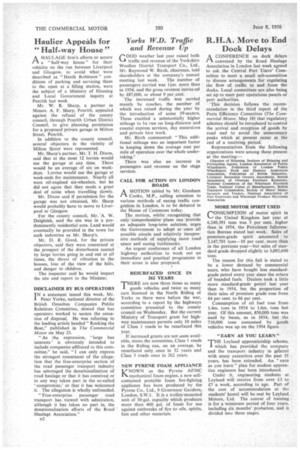R.H.A. Move to End Dock Delays
Page 56

If you've noticed an error in this article please click here to report it so we can fix it.
A CONFERENCE on dock delays r"L convened by the Road Haulage Association in London last week agreed to ask the Central Port Users' Committee to meet a small sub-committee to discuss arrangements for regulating the flow of traffic to and from the docks. Local committees are also being set up to meet port operations panels oi port authorities.
This decision follows the recommendation in the third report of the Ports Efficiency Committee (The Commercial Motor, May 18) that regulatory schemes should be introduced to control the arrival and reception of goods by road and to avoid the unnecessary peaks which at present occur at the end of a receiving period.
Representatives from the following organizations were among those present at the meeting:— Chamber of Shipping, Institute of Shipping and Forwarding Agents, London Association of Public Wharfingers, Federation of London Public Wharfingers, Dock and Harbour Authorities Association. Federation of British Industries. I iverpool Steamship Owners Association, British Association of Overseas Furniture Removers, National Committee of the Wholesale Provision Trade, National Union of Manufacturers. British Transport Commission, Society of Motor Manufacturers and Traders. National Association of Port Employers and Wholesale Produce Merchants Association.
MORE MOTOR SPIRIT USED CONSUMPTION of motor spirit in ‘.--• the United Kingdom last year at 6,240,391 tons was 5 per cent, higher than in 1954, the Petroleum Information Bureau stated last week. Sales of premium-grade spirit amounted to 3,147,701 tons-10 per cent, more than in the previous year—but sales of standard grade dropped slightly to 3,092,690 tons.
The reason for this fall is stated to be a lower demand by commercial users, who have bought less standardgrade petrol every year since the return of branded fuels. Dealers took a little more standard-grade petrol last year than in 1954, but the proportion of their sales of premium grade rose from 64 per cent. to 66 per cent.
Consumption of oil fuel rose from 1.4m. tons in 1954 to 1.6m. tons last year. Of this amount, 850,000 tons was used by buses, as in 1954, but the 710,000 tons consumed by goods vehicles was up on the 1954 figure.
"EARN AS YOU LEARN"
'THE Leyland apprenticeship scheme, i which has provided the company and the transport industry in general with many executives over the past 35 years, has been extended. An "earn as you learn" plan for student apprentice engineers has been introduced.
Under it, engineering students at Leyland will receive from over £.3 to £7 a week, according to age. Part of the cost of accommodation at the students' hostel will be met by Leyland Motors, Ltd. The course of training is for a minimum period of four years, including six months' probation, and is divided into three stages.




















































































































































